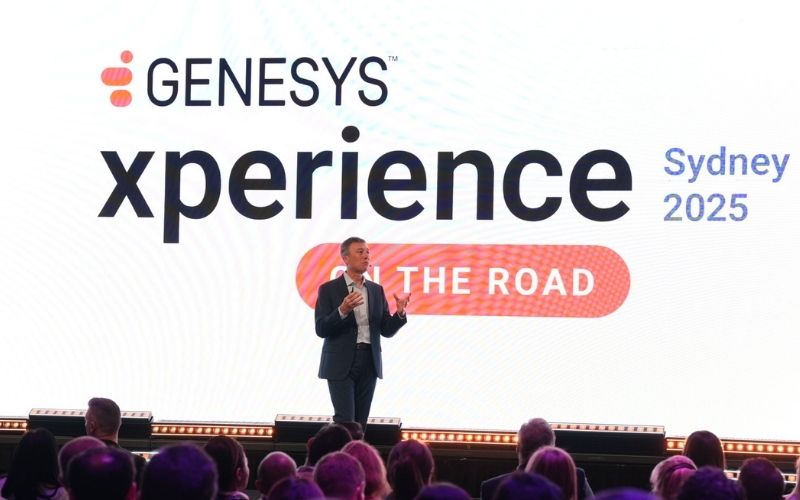Genesys explained its vision for the future of AI and CX at their Xperience event in Sydney today. That vision embraces the concept of universal experience orchestration – the ability to coordinate every customer and employ interaction, across the entire organisation and in real-time.
Genesys’s roadmap for experience orchestration centres on advancing the Genesys Cloud platform to becoming a platform for Agentic AI-Powered Experience Orchestration, where each customer and employee touchpoint is managed to deliver experiences that are effective, efficient and emotionally intelligent at scale.

In the first session of the day, Peter Graf, Senior Vice President, Strategy, highlighted the two key problems Genesys is trying to solve for its clients:
- Customer attrition: On average, companies face high customer loss rates. This number can become even more shocking in specific industries or during specific, poorly- handled experiences.
- Employee attrition: A substantial number of employees are leaving their roles every year. This is a difficult job, and high turnover leads to a perpetual re-hiring cycle. Companies with thousands of agents can face 100% attrition rates in certain areas, resulting in immense financial waste and significant productivity losses.
Solving these problems requires moving beyond siloed, reactive systems and embracing the AI-driven approach of experience orchestration.
Graf says, “The transformation we are witnessing is driven by the collision of two forces: the business imperative of power moving decisively to the customer, and the technology disruption of AI capabilities developing at light speed. These two forces—one commercial, one technological—are together driving a significant change. This is arguably the biggest transformation we have ever seen in our industry”.
“The old service economy model—using tactical AI attached to CCaaS—is insufficient. The strategic use of AI puts the AI at the core of the platform to drive both loyalty/growth and operational efficiency simultaneously”.
Real-life use of AI
Throughout the day, delegates at Genesys Xperience Sydney 2025 were immersed in real-world success stories, hearing directly from a diverse range of Genesys clients who have pioneered the use of AI to dramatically elevate their customer and employee experiences.
Attendees gained strategic insights from case studies featuring organisations, including:
- Engie: Detailing how they leveraged the Genesys Cloud platform and its AI capabilities to unify complex service interactions, focusing on achieving superior operational efficiency while deepening customer trust across their energy services portfolio.
- Charles Sturt University: Showcasing their digital transformation journey, explaining how they utilised Genesys’s orchestration capabilities to deliver highly personalised, continuous support to their student body—from initial enrolment to post-graduation services—proving that the experience economy is critical even in the education sector.
- Latitude: Illustrating the tangible business impact of adopting Agentic AI, specifically demonstrating how they deployed autonomous, intelligent agents to manage complex financial service requests, resulting in accelerated problem resolution, reduced internal operating costs, and a measurable improvement in customer satisfaction metrics across their product lines.
These client presentations underscored the conference’s central theme: the transition from tactical automation to strategic, AI-powered experience orchestration is not just theoretical—it is actively driving measurable business value today across diverse industries.
Rapid pace of innovation is putting pressure on businesses

A core challenge for many organisations is managing the rapid pace of innovation around AI while focusing on delivering measurable business outcomes. Albert Nel, Senior Vice President, Asia-Pacific, Genesys, comments, “Genesys introduced 500 new features last year, creating complexity for adoption. The strategy is to simplify the process, focusing on what drives business outcomes rather than adopting every feature. Adoption must be based on meeting clear business objectives, not just the FOMO. While FOMO can motivate initial interest, the investment must be justified by a solid business case”.
Genesys uses an AI maturity model based on five levels of experience orchestration:
Level 1: This is the foundational stage, characterised by minimal automation and basic personalisation.
Level 2: This stage introduces early automation and predictive technologies but relies on rigid rules.
Level 3: This is the stage where organisations begin leveraging modern Generative AI capabilities.
Level 4: This is the current cutting-edge level, focused on the introduction of AI that can reason and plan.
Level 5: Universal orchestration –This is the future state, where orchestration delivers truly autonomous, hyper-personalised experiences across the entire enterprise ecosystem.
Explaining where organisations fit withing those maturity levels, Nel highlights, “most organistions are currently situated between level 2 and level 3. Level 4 introduces Agentic AI but still operates within a human-plus-AI paradigm. The aspirational stage is universal orchestration, or Level 5. This level transforms the customer experience into having a personal concierge. When a customer contacts a brand—via any channel, be it digital, voice, or otherwise—the system instantly knows exactly who they are, possesses their full engagement history, learns their desired communication style, and can then proactively help and support them”.
“Reaching Level 5 requires fully leveraging Agentic AI and the integration of new standards for interoperability, ultimately enabling the system to orchestrate the entire customer journey across the company”.

